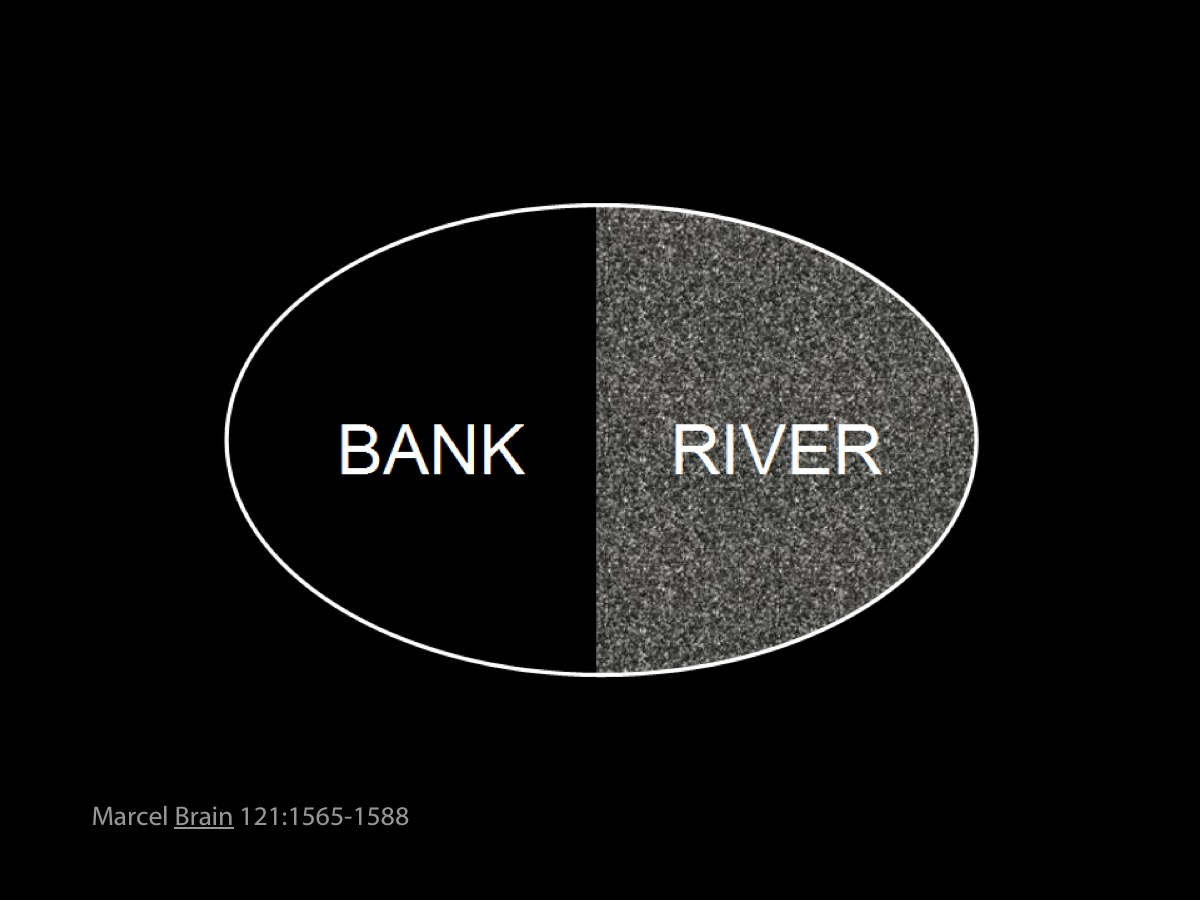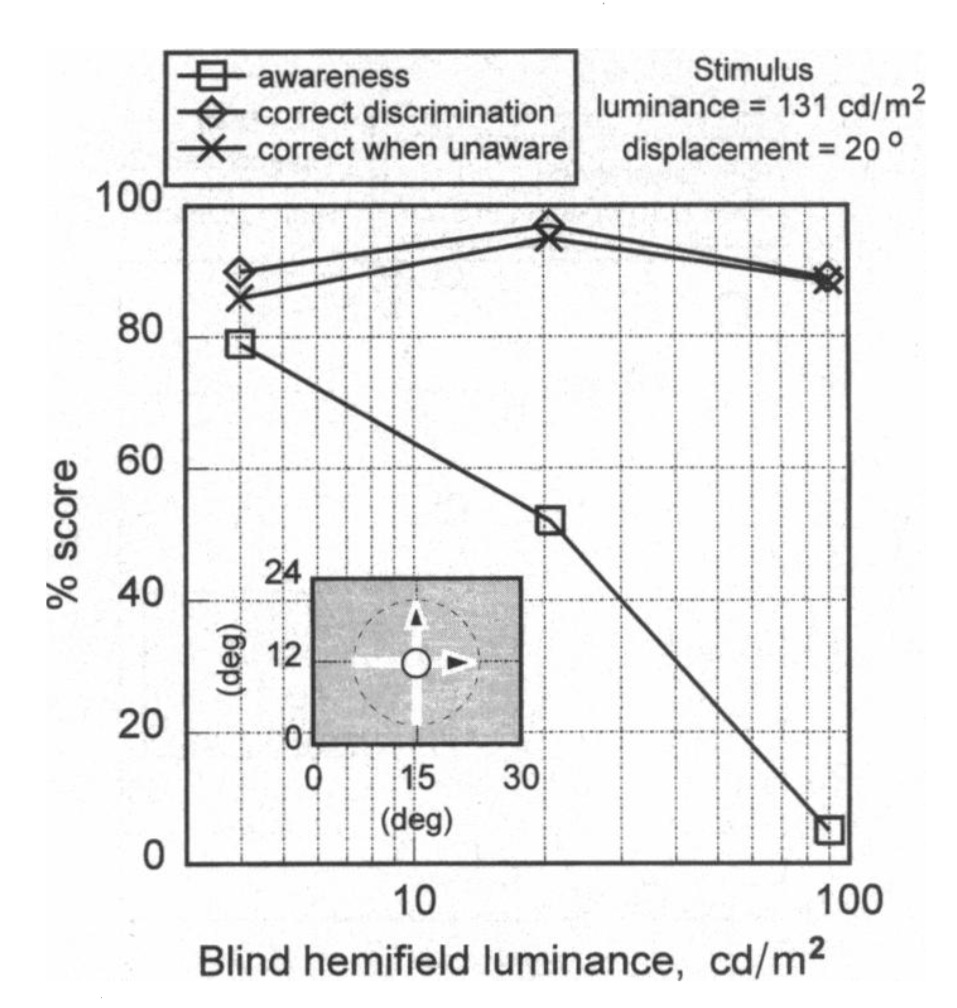Click here and press the right key for the next slide (or swipe left)
also ...
Press the left key to go backwards (or swipe right)
Press n to toggle whether notes are shown (or add '?notes' to the url before the #)
Press m or double tap to slide thumbnails (menu)
Press ? at any time to show the keyboard shortcuts

Previous lecture:
What are the functions of perceptual awareness?
This lecture:
Can you perceive something without being perceptually aware of it?
‘Here lies the fatal flaw in [...] the philosophy of mind,
for, in using as evidence what seems reasonable or persuasive, philosophers ultimately rely on their own introspections.
They look inside themselves in an attempt to discover the design of the mind’
Bridgeman, 2004 p. 380
Can you perceive something without being perceptually aware of it?
Yes : Sidis
Yes : blindsight

Sidis’ subjects are not perceptually aware of the letter but can identify and report it.
k k k k
Can you perceive something without being perceptually aware of it?
Yes : Sidis
Yes : blindsight



Weiskrantz et al, figure 2
Awareness makes no measurable difference to action.
Can you perceive something without being perceptually aware of it?
Yes : Sidis
Yes : blindsight

Simple Seeing
‘If psychologists can really identify something that deserves to be called perception without awareness, they must have an operational grasp on not only what it takes to perceive something, but on what it takes to be conscious of it.
Dretske, 2006 p. 148

Siegel & Shuster, 1939 (Issue 1)

Siegel & Shuster, 1939 (Issue 1)


Siegel & Shuster, 1939 (Issue 1)
Does Lois see the unbearable coward?
Does Lois see the unbearable coward?
1. Lois sees Superman.
2. Superman is Clark.
3. Clark is the unbearable coward.
Therefore:
4. Superman is the unbearable coward.
Therefore:
5. Lois sees the unbearable coward.
1. If Lois could see the unbearable coward, she’d know where he is.
2. Lois does not know where the unbearable coward is.
Therefore:
3. Lois cannot see the unbearable coward.
Simple Seeing (aka Nonepistemic Seeing)
Key characteristic of simple seeing: if X is the F, then S sees X is equivalent to S sees the F.
Dretske, 1969 chapter II; Dretske 2000 chapter 6
‘If psychologists can really identify something that deserves to be called perception without awareness, they must have an operational grasp on not only what it takes to perceive something, but on what it takes to be conscious of it.
Dretske, 2006 p. 148


Siegel & Shuster, 1939 (Issue 1)
Can you perceive something without being perceptually aware of it?
‘Perception without awareness [...] is therefore to be understood as perception of some object without awareness [...] of that object’
Dretske, 2006
‘Here lies the fatal flaw in [...] the philosophy of mind,
for, in using as evidence what seems reasonable or persuasive, philosophers ultimately rely on their own introspections.
They look inside themselves
in an attempt
to discover the design of the mind’
Bridgeman, 2004 p. 380

A Test for Perception?

‘If psychologists can really identify something that deserves to be called perception without awareness, they must have an operational grasp on not only what it takes to perceive something, but on what it takes to be conscious of it.
Dretske, 2006 p. 148
blindsight:
infer perception from discrimination of visual stimuli
You must have got information about the thing
and ‘the information in these states should be available for the control and guidance of action’
and ‘the information should be extracted from stimulation [...] by accredited receptor systems.’
Dretske, 2006 p. 150

Operationalising Perception and Perceptual Awareness
‘If psychologists can really identify something that deserves to be called perception without awareness, they must have an operational grasp on not only what it takes to perceive something, but on what it takes to be conscious of it.
Dretske, 2006 p. 148
blindsight:
infer perception from discrimination of visual stimuli
we infer lack of awareness from the subject’s reports

Operationalising Visual Awareness
‘If psychologists can really identify something that deserves to be called perception without awareness, they must have an operational grasp on not only what it takes to perceive something, but on what it takes to be conscious of it.
Dretske, 2006 p. 148
blindsight:
infer perception from discrimination of visual stimuli
we infer lack of awareness from the subject’s reports
x
Task 1 : Say when you can see which letter it is.
Task 2 : Guess the letter (forced choice).
Ready? Go!
Group 1: £10 if you answer correctly, -£1 wrongly
Group 2: £1 if you answer correctly, -£10 wrongly
‘If psychologists can really identify something that deserves to be called perception without awareness, they must have an operational grasp on not only what it takes to perceive something, but on what it takes to be conscious of it.
Dretske, 2006 p. 148
blindsight:
infer perception from discrimination of visual stimuli
we infer lack of awareness from the subject’s reports

conclusion
Can you perceive something without being perceptually aware of it?
Sidis’ 1898 results, and blindsight, appear to imply you can.
But drawing this conclusion requires us to accept implicit assumptions about the operationalisation of perception and perceptual awareness:
What does it take to perceive something?
What does it take to be conscious of something?